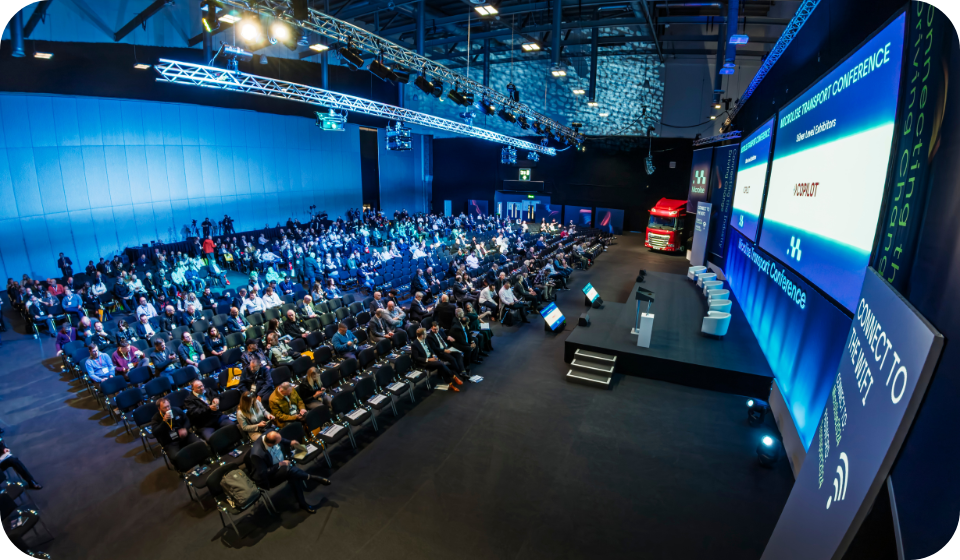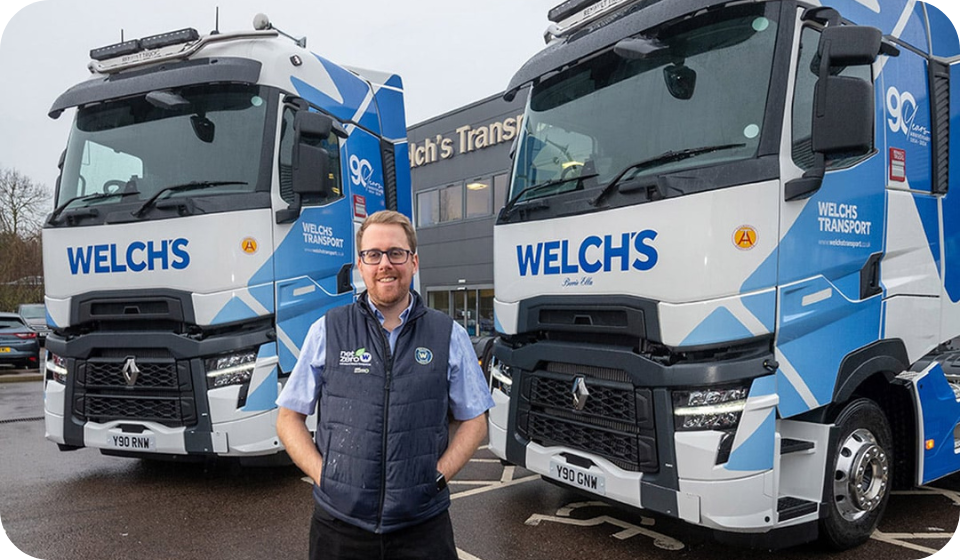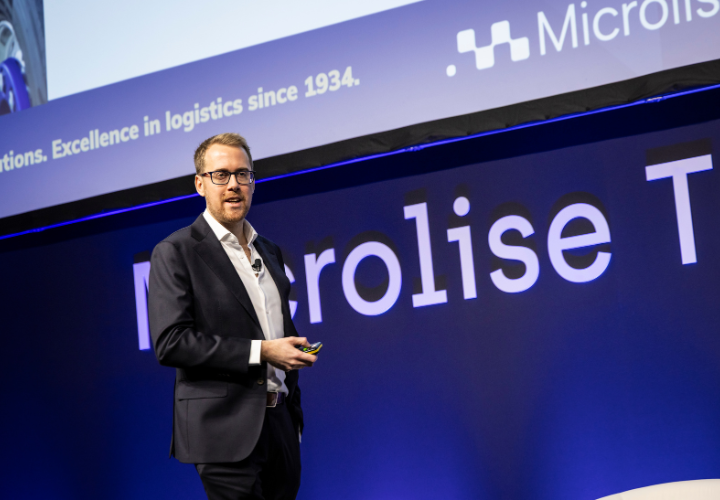When it comes to sustainable fleets of the future, what comes to mind?
Is it HVO and biofuels? Electric vehicles? Or perhaps you think hydrogen fuel cells are the way forward…
The annual Microlise Transport Conference always offers up a great opportunity to ask these big questions.
Last month at the Coventry Building Society Arena, we were delighted to welcome Chris Welch, Managing Director of Welch Transport, to the main stage. His feature ‘Beyond the Electric Fleet’ was about sharing his experience of creating a sustainable transport ecosystem through:

Innovative energy management

Shared infrastructure partnerships

Cutting-edge technology integration
More than an electric fleet
As early adopters, the Welch Group were keen to embrace electric vehicles, introducing the Renault E-Tech T Electric HGV to their fleet in 2023. But proving that there’s more to it than just electric vehicles, Chris talked openly about the group’s collaborative journey to sustainability. Sharing his experiences and findings, there was plenty to learn and lots of questions from the audience.
Watch his ‘Beyond the Electric Fleet’ talk here 👇
More of your questions: answered
With so many questions on the day, there wasn’t enough time to answer them all, so we caught up with Chris backstage to pose some more of your burning questions.
Kicking off, we were keen to hear his feedback from the conference…
Q: Did you enjoy your hosting your session on the main stage?
Chris: Absolutely! The room was buzzing and full of energy. I love sharing our story, showing real-world experiences – the good and the bad – as we learn and discover how to make our electric HGV operation a commercial success.
Q: Great stuff. As we said there were lots of questions for you on the day, so we’ve got a few here that we know people want to hear more on…
Firstly, do you really think EVs are green, or is it just a case of greenwashing?
Chris: EVs are genuinely greener, and the data backs it up. Even on a grid that’s only partly renewable, EVs produce far lower emissions over their lifetime than a diesel or petrol engine.
Q: But what about the manufacturing and mining that comes with batteries, is that green?
Chris: Manufacturing is energy intensive, but its front-loaded; combustion engines pollute every single mile. And as for the mining side, yes, batteries use critical minerals – but so do smartphones, laptops and even catalytic converters.
What’s changing is traceability and responsible sourcing. The industry’s moving toward lower-impact supply chains and alternative chemistries, like LFP, are reducing reliance on cobalt and nickel.

Q: What is the ‘end of life’ plan for electric vehicles, in terms of the batteries and the vehicles?
Chris: End of life needs to be understood more. Batteries can be repurposed for storage, then recycled giving them a second or third life, but we believe, like we see in the PSV sector with buses and coaches, batteries are lasting past the proposed 10-year life cycle.
Q: When it comes to weight, how can operators manage the extra load eHGVs present?
Chris: It’s true, we lose around 2.5t. It’s not ideal but we’ve found it actually doesn’t impact many jobs, as very few of our trucks run at max weight. Even our double decker LSTs which go to our network hubs. Future legislation and battery gains will help address this. As battery density improves, more use cases will open up.
For now, it’s about tackling low-hanging fruit and at a 24.5t payload we could probably transition 50%+ of the fleet. As for legislation, there’s currently work being undertaken on increasing drive axle weights.
Q: Should the DfT amend vehicle weights to accommodate the difference between diesel and electric vehicles?
Chris: Yes. As I said, eHGVs are indeed heavier. Long term, technology and policy will balance out. Vehicle engineering, suspension, load weight management has come a long way since the country initially increased the max weight to 44t in the 1990’s, so the impact on the roads is more manageable. The drive axles are what needs to be looked at next as a priority.
Q: In terms of efficiency then, what is the average range of your eHGVs and does the cold cause many problems?
Chris: We can achieve 200 miles on a full charge in good conditions. With a 45-60min charge at a high-speed charger this increases to 300 miles. Cold weather does affects range but preconditioning and route planning help a lot.
Q: How accepting of change are your customers to paying for or accepting the operational limitations of zero emission transport?
Chris: More than you’d expect. If the service is solid and the emissions are lower, many are on board. Widescale uptake will probably never come before price, and as always in this industry, it is about ensuring that you price yourself sustainably too, as opposed to it being a ‘race to the bottom’.

Q: So, you don’t think eHGVs are perfect?
Chris: No, but they’re a huge step forward. We shouldn’t compare them to a fantasy zero-impact option that doesn’t exist. We should compare them to diesel, and on that front, they win hands down.
Q: Do you believe that hydrogen could be a more viable sustainable fuel solution than electric?
Chris: No, EVs are more efficient, already viable and scaling fast. Hydrogen is too expensive and inefficient, unless you operate next to a Hydrogen Powerstation! There might be a place for them in heavy haulage but by the time that happens, battery technology will probably be advanced enough to tackle that hurdle as well.
Q: Finally, what do you think is needed to support the wider rollout out of eHGVs and can this be achieved in time to meet Net Zero targets?
Chris: Shared charging, battery storage and smarter energy use are driving costs down and speeding things up. And the private sector is moving fast. Once eHGVs have a clear Total Cost of Ownership (TCO) advantage – and that’s coming – operators will switch en-masse. The 2035 deadline will be the real milestone when everything below 26t is alternatively fuelled, and I can see TCO modelling achieving parity before 2030.
Thank you, Chris!
The learning just keeps on coming, even a month after #MTC25! We really appreciate you taking the time to answer our questions and we know, both delegates from the show and new readers will have lots to take away.
Missed Chris’s session at #MTC25?
Catch Chris’s talk, plus all the main stage features on our YouTube channel now.


